Commission Reports and Official Recommendations
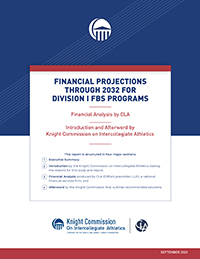 Report: Financial Projections through 2032 for Division I FBS Programs (2023)
Report: Financial Projections through 2032 for Division I FBS Programs (2023)
Released in September 2023, this report is based on a new analysis from financial services firm CLA (CliftonLarsonAllen, LLP) that used actual athletics revenue and expense data, along with new projected revenue, to model a future financial landscape for the coming decade for public FBS athletics programs. Projected new and uncommitted annual revenue exceeds more than a billion dollars from an expanded 12-team College Football Playoff and more lucrative conference media rights agreements.
With this financial windfall, CLA projects the total annual athletics revenues from all sources at FBS institutions to be $20.9 billion in 2032. Of that total, a staggering $16.7 billion is projected to be generated just by the athletics programs at 54 Autonomy 5 public institutions.
The report finds that if today’s well-established spending practices continue, billions in new revenue from the expanded College Football Playoff (CFP) and escalating conference media rights contracts will dramatically accelerate the cost spiral of exorbitant football coaching salaries and football coaching severance pay.
- Report: Financial Projections through 2032 for Division I FBS Programs
- Executive Summary
- Press Release (PDF)
Recommendation on new Racial Equity Graduation Gap filter for NCAA Academic Incentives (May 2022) In 2021, the NCAA began awarding “academic units” to institutions for athletic programs that met one of three academic standards. The NCAA is phasing in the distribution of this revenue slowly, but by 2032, more than $1 billion in revenue distributions will be awarded through this new Academic Performance Program. Based on the most recent public data from 2019, nearly 80 percent of the roughly 350 Division I institutions would qualify for the academic unit by meeting one of the three benchmarks for academic success. However, 47 of those schools had a graduation gap of more than 25 percentage points between their Black and White Athlete Graduation Success Rates (GSRs). The Knight Commission is recommending that to qualify for academic-based awards, institutions must first demonstrate that the gap between their Black and White Athlete GSRs is not more than 25 percentage points.
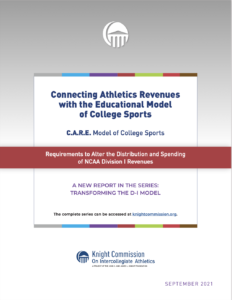 Report: Connecting Athletics Revenues with the Educational Model of College Sports (C.A.R.E. Model) (released September 2021, updated December 2023)
Report: Connecting Athletics Revenues with the Educational Model of College Sports (C.A.R.E. Model) (released September 2021, updated December 2023)
The Commission released a major proposal to more closely connect the distribution and spending of shared athletics revenues with the broad educational mission of college athletics programs. The C.A.R.E. Model would alter the distribution criteria and uses of funds for billions distributed annually by the NCAA, CFP, and Division I conferences.
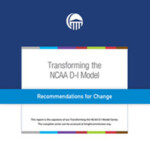
Achieving Racial Equity in College Sports (2021)
The Commission’s new report highlights opportunities and steps to move toward fulfilling the goal of equitable treatment, and places special emphasis on moving from pledge to policy and advocacy to action. We believe the implementation of our recommendations will positively impact the experiences of Black athletes across all of college sports. The NCAA and its member institutions must act now to transform college sports by taking decisive action in four areas:
- Closing educational opportunity gaps to create an equitable pathway for Black athletes’ success during and after college.
- Holding institutions accountable in recruitment and hiring to achieve diversity and equity in athletics leadership.
- Investing in programs that support and enhance Black athletes’ college experience and promote inclusion and belonging.
- Creating more equitable opportunities for Black athletes to assume leadership roles, especially in advocacy and governance.
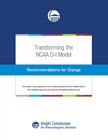 Transforming the NCAA D-I Model: Recommendations for Change (2020)
Transforming the NCAA D-I Model: Recommendations for Change (2020)
After a year-long examination, the Knight Commission on Intercollegiate Athletics called for major governance changes for Division I sports, proposing a new governing entity for the sport of football at the Football Bowl Subdivision (FBS) level, separate from the NCAA. The NCAA would govern all other sports in a reorganized Division I governance, and schools with FBS football programs would remain part of the NCAA in all other sports except football. The Commission outlined its recommendations in a new report, Transforming the NCAA D-I Model: Recommendations for Change.
View “Transforming the NCAA D-I Model” video recordings, reports, presentation materials and more.
- Letter to NCAA President Mark Emmert Recommending Changes to the Division I Revenue Distribution Formula, October 26, 2020
- Letter to NCAA President Mark Emmert Recommending Guiding Principles for New Rules on the Use of College Athletes’ Name, Image and Likeness, April 6, 2020
- Memo to NCAA re: Recommendations to the Commission on College Basketball, June 19, 2018
- Letter to Condoleezza Rice, Chairperson, NCAA Commission on College Basketball, March 27, 2018
- Summary of Action on Knight Commission Recommendation to Change NCAA Financial Reports to Disclose Football Coaches’ Postseason Bowl Bonuses, October 17, 2017
- Memo to College Football Playoff Board of Managers, September 20, 2017
- Memo to NCAA re: Recommendations to strengthen educational opportunities through college sports, March 16, 2015
- Memos to NCAA re: Governance recommendations, August 6, 2013 and October 15, 2013
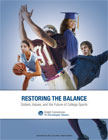 Restoring the Balance: Dollars, Values, and the Future of College Sports (2010)
Restoring the Balance: Dollars, Values, and the Future of College Sports (2010)
This report aims to set forth reforms that are achievable and that, if implemented, will create a foundation upon which future reforms can build. Our blueprint for restoring educational values and priorities begins with strengthening accountability for athletics programs in three ways: requiring greater transparency and the reporting of better measures to compare athletics spending to academic spending; rewarding practices that make academic values a priority; treating college athletes as students first and foremost — not as professionals.
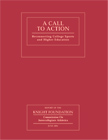 A Call to Action: Reconnecting College Sports and Higher Education (2001)
A Call to Action: Reconnecting College Sports and Higher Education (2001)
A ten-year review of progress made since the original Commission report, calling for a stronger commitment to academic standards in college sports.
 Reports of Knight Foundation Commission on Intercollegiate Athletics (1991-1993)
Reports of Knight Foundation Commission on Intercollegiate Athletics (1991-1993)
The commission’s 1991 report, Keeping Faith with the Student Athlete, called for presidential control of intercollegiate athletics to ensure academic and fiscal integrity verified through a transparent certification process. The 1992 and 1993 reports followed the progress of the Commission’s recommendations. All three reports are included in this document.
